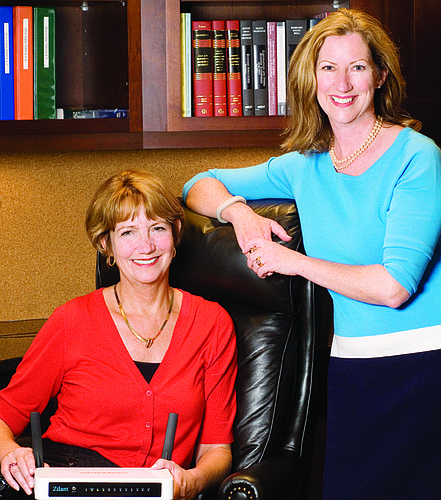- November 25, 2024
-
-
Loading

Loading

The future of home nursing care may come in a little box manufactured by a Malaysian company called Zilant.
McKenney Home Care, launched by two health care executives in Naples, is taking a novel approach to the business. Instead of selling round-the-clock nursing care, Michele McKenney and Patrice McGrath will offer a combination of human touch and advanced monitoring technology made by Zilant.
The way most home-care operations work is they link patients with home-care nurses who are independent contractors, negotiating a cut of the hourly rates. That employment relationship allows agencies to manage the seasonality of the business in areas such as Naples, ramping up when the population swells in the winter and down when it slows in the summer.
McKenney's strategy is different. The company plans to build a staff of nurses who are employees of the firm, not independent contractors. To manage seasonality, McKenney plans to provide its patients with the Zilant home-monitoring device on a monthly subscription basis.
The subscription income from the Zilant device, which will range from $150 to $250 a month per patient, will smooth out revenues when the summer season inevitably slows the nursing-care business in Naples. “It evens out the seasonality because they can take it to Cleveland [in the summer],” says McKenney.
The Zilant device is a portable wireless computer the size of a modem that can communicate with whomever the patient chooses. A patient can attach as many as 20 different devices to it, such as an oximeter to measure heart rate, a glucometer to measure blood sugar, a camera for video observation and a motion detector to monitor activity.
It's compliant with health care laws governing privacy, says McGrath, an attorney by training. “The patient owns the data,” she says, noting that many “tele-health” systems are owned by health care organizations.
Patients can share personal health information with whomever they choose: their doctor, a hospital or with McKenney. For example, a patient might need assistance for 16 hours, but with a Zilant device he or she might only need eight hours of personal help. Without the device, a patient might have to pay for more hours of an aide, which costs $23 an hour with McKenney. “People may not be able to afford 16-hour care,” McKenney says.
That's important because government or public health insurance plans don't cover home care. Patients must pay for that service in cash or with the proceeds of a long-term-care insurance plan, if they have one.
Despite the lack of insurance reimbursement, McKenney and McGrath are both seasoned health care executives who anticipate growth in the home-care sector. For example, hospitals are under pressure to move patients out quickly to recover at home. Under new health care laws, hospitals get penalized for patients who overstay and rewarded for early discharges.
McKenney, who holds a master's degree in public health and a law degree, was the president of two major divisions of the University of Pittsburg Medical Center. Magrath was the CEO of the International Osteoporosis Foundation in Switzerland, where she reorganized the international organization.
McKenney owns a home in Naples with her husband, Charles Cohen, the founding partner of Cohen & Grigsby law firm. Magrath moved to Naples with her husband, Terrence Magrath, founding partner of ValueQuest. “What are we going to do?” the sisters asked themselves last year when they reunited in Naples. “We're not great golfers.”
The sisters launched McKenney Home Care this summer and they're investing about $200,000 to start the business. “We're self-financing the business,” McKenney says, estimating it will take about one to three years to break even. “The market is tight and there's lots of competition.”
In addition to individual patients in Lee and Collier counties, McKenney plans to market to assisted-living facilities in the area. They hope the technology advantage will help them win more customers, perhaps outside the region, too. “This technology doesn't exist,” McKenney says. “We're really a prototype.”